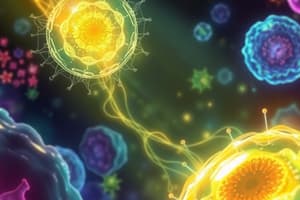Podcast
Questions and Answers
What is the primary material that makes up the cell wall in plant cells?
What is the primary material that makes up the cell wall in plant cells?
- Protein
- Lignin
- Chitin
- Cellulose (correct)
How do plant cells differ from animal cells in terms of rigidity?
How do plant cells differ from animal cells in terms of rigidity?
- Plant cells are generally more rigid due to the presence of a cell wall. (correct)
- Plant cells are less rigid due to the absence of a cell wall.
- Animal cells are more rigid due to the presence of lysosomes.
- Plant cells lack a plasma membrane, making them less flexible.
What is a key significance of understanding cells as the basic units of life?
What is a key significance of understanding cells as the basic units of life?
- It shows that animals and plants have similar cellular structures.
- It impacts research into cellular processes, disease mechanisms, and treatments. (correct)
- It complicates the study of ecosystem dynamics.
- It allows for a clearer understanding of genetic inheritance.
What structural feature of mitochondria increases surface area for energy production?
What structural feature of mitochondria increases surface area for energy production?
Why is the small size of ribosomes important for their function?
Why is the small size of ribosomes important for their function?
Flashcards
Plant Cell Wall Function
Plant Cell Wall Function
The cell wall gives plant cells shape and protection, made of cellulose.
Cell as Basic Unit
Cell as Basic Unit
Cells are the fundamental units of all living organisms.
Plant vs. Animal Cells
Plant vs. Animal Cells
Plant cells have cell walls, chloroplasts, and a large central vacuole; animal cells do not.
Structure-Function Relationship (Organelles)
Structure-Function Relationship (Organelles)
Signup and view all the flashcards
Mitochondria Structure
Mitochondria Structure
Signup and view all the flashcards
Study Notes
Cell Wall Role and Differences
- Plant cell walls provide structural support and protection, made of cellulose
- Cell walls differ from cell membranes, which are flexible and control substance movement
- Plant cell walls are rigid, while animal cell membranes are flexible
Significance of Cellular Concept
- Cells are the basic unit of life, impacting biological research
- Understanding cell structure/function helps investigate fundamental biological processes, disease mechanisms, and potential treatments
Plant vs. Animal Cell Differences
- Plant cells have cell walls, chloroplasts, and large central vacuoles
- Animal cells lack these structures, impacting cell rigidity and flexibility
- Plant cells are generally more rigid due to their walls, whereas animal cells are more flexible
Organelle Structure and Function
- Organelles' structure directly influences their function
- For example, mitochondria's folded membranes increase surface area for energy production
- Ribosomes' small size enables efficient protein synthesis
- This relationship ensures each organelle performs its specific function efficiently within the cell
Studying That Suits You
Use AI to generate personalized quizzes and flashcards to suit your learning preferences.




